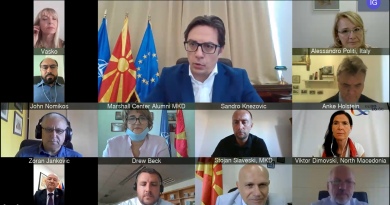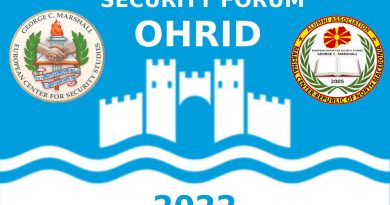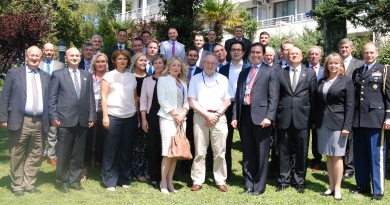Key points from Ohrid virtual seminar 27 August 2020
- The COVID-19 pandemic has introduced a new major challenge into an already complicated security environment for Southeast Europe and the Euroatlantic community as a whole. Together with straining health systems, it has catalyzed a fresh wave of disinformation (“infodemic”) from malign state and non-state actors including China and Russia. Fake news and conspiracy theories about the coronavirus aim to spread confusion, division, and mistrust.
- Strengthening resilience against such threats will require credible public engagement, capacity-building to recognize and expose disinformation (including the partially “Potemkin” nature of Chinese and Russian aid), intensified Euroatlantic presence and perspective, internal Euroatlantic unity, and further steps against corruption. Failure could leave Southeast Europe a buffer zone increasingly subject to influence by actors who don’t share Euroatlantic interests or ideals.
- The COVID-19 pandemic has coincided with a broader increase of security concerns in relation toward China. This key issue within the NATO Reflection and EU Strategic Compass processes also carries implications for the countries of Southeast Europe.
- NATO’s Hub for the South shows the alliance can also further contribute to addressing transnational security challenges including migration, organized crime, and violent extremism. To do so most effectively, however, the Alliance should calibrate its ambitions, concentrate on areas of comparative advantage, and work together with the European Union and other organizations.
- The strategic breakthrough of NATO membership and green light to begin EU accession negotiations were important good news stories for North Macedonia and the wider region amidst the other challenges this year.
- The interdependent nature of international and Euroatlantic security means it is important also for leaders and publics in Southeast Europe actively to learn and prepare to contribute to addressing challenges in a spirit of cooperation and solidarity rather being passive observers.
KEY MESSAGES:
- THE COVID-19 PANDEMIC HAS INTENSIFIED PRE-EXISITING PRESSURES AND HIGHLIGHTED THE GROWING ROLE OF THE INFORMATION SPHERE IN SOUTHEAST EUROPE’S SECURITY
- THE COUNTRIES OF SOUTHEAST EUROPE ARE SUBJECTS, NOT JUST OBJECTS OF REGIONAL AND BROADER EUROATLANTIC SECURITY
- THINK STRATEGICALLY ABOUT THE FUTURE
Please follow and like us:



